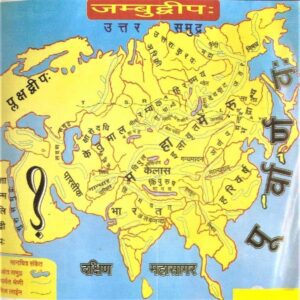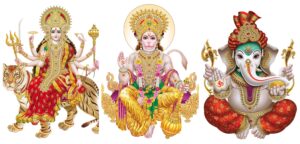Can We Chant Mantras During Periods?
The question of whether one can chant mantras during menstruation is a topic surrounded by cultural taboos and spiritual curiosity. It’s important to understand that in Hinduism, mantras are not mere words; they are the deity themselves, a powerful tool that can connect the devotee with the divine when chanted with devotion and proper understanding.

Why Mantras work?
Some people wonder, “Will a mantra really work? Isn’t it just a sound?” Lets try to understand this from the below verses from scriptures:
सर्वमन्त्राधिकारं तु शिवस्तु प्रतिपादयेत्।
Shiva is the ultimate authority on all mantras and imparts their significance.
शिवः सर्वमन्त्रानां सर्वानुग्रहकारकः।
Shiva is the origin of all mantras and the bestower of all grace
सर्वमन्त्रेच्छया युक्तः सर्वमन्त्रं यथा विदुः।
He who is endowed with the power of all mantras is known to be Shiva, the source of all mantra knowledge
सर्वमन्त्रदातृशिवः सदा तस्य महेश्वरः।
Shiva, the great Lord, is the eternal giver of all mantras.
The truth is, mantras are far more than just sounds; they are divine vibrations that hold immense spiritual power. Mantras work because they were given to the world by Lord Shiva himself. Every mantra in existence, whether it’s dedicated to any deity, rooted in Vedic tradition, or part of Tantric practices, was spoken from the mouth of Shiva. It is Shiva who empowers and authorizes each mantra, ensuring that when chanted with devotion and the right intent, it will bring about the desired spiritual effect.
Understanding the Misconception
One of the most common misconceptions is that menstruation is impure, and therefore, women should refrain from engaging in spiritual practices like chanting mantras. However, this belief is not rooted in the authentic shastras of Hinduism but rather in societal norms and traditions.
Menstruation is a natural physiological process, and Hindu scriptures do not explicitly categorize it as impure. Instead, the focus is on maintaining inner purity through righteous living and spiritual practices. It’s important to clarify that the act of menstruation itself does not make a woman spiritually impure or incapable of performing spiritual activities.
Scriptural Perspective on Chanting Mantras During Periods
नास्ति सुतका स्त्रीणां रजस्वलानां च भक्तितः।
भक्त्या परमया युक्ता यदा यत्राभ्युपस्थिताः॥
There is no impurity in women due to childbirth or menstruation when they are filled with devotion. Wherever and whenever they are present with supreme devotion, they are pure.
भक्त्या संप्रवृत्यैव नारीणां नैव दूषणम्।
रजःकालमपि प्राप्य सदा पूज्यन्ति तत्पराः॥
Women devoted to worship have no impurity, even during their menstrual periods. They are always worthy of reverence.
न स्त्रीणां रजसा दोषो न मरणेन जायते।
भक्त्या परमया युक्ता यदा यत्राभ्युपस्थिताः॥
There is no fault in women due to menstruation or death. They are pure whenever they are filled with supreme devotion.
According to the Vedas and Upanishads, menstruation is not viewed as spiritually contaminating. The emphasis is on the intent and inner state of the practitioner rather than on physical conditions. However, there are some guidelines, especially for those deeply involved in sadhana.
1. For Advanced Sadhakas:
Advanced practitioners, those who have attained a high level of spiritual progress, may continue their mantra chanting during menstruation. These individuals have transcended bodily limitations and are able to maintain their spiritual discipline without interruption. However, this level of spiritual attainment is uncommon, and most people are not at this stage.
2. For Common Practitioners:
For those who are not advanced sadhakas, it is generally advised to refrain from chanting mantras in temples or sacred spaces during menstruation. This guidance is not based on impurity but rather on the belief that menstrual blood, representing the creative energy of the divine mother, is potent and should not intermingle with the sacred rituals performed in temples.
3. If You Have Received Mantra Diksha:
For those who have received mantra diksha (initiation) from a guru, the rules are more relaxed. With the guru’s permission, you can continue your mantra recitation during menstruation. Mantra diksha symbolizes a spiritual connection between the disciple and the guru, allowing the disciple to carry out spiritual practices under the guru’s guidance, even during menstruation.
4. Without Mantra Diksha:
Even if you have not received mantra diksha, you can still chant mantras during your menstrual cycle. It is suggested to do so in a relaxed environment outside the pooja room or temple. You can sit in a peaceful, distraction-free area and engage in mantra japa (repetition) as a personal spiritual practice.
Practical Guidelines for Chanting Mantras During Periods
सुखं दुःखं समं कृत्वा लाभाल लाभं समं ज्ञात्वा मान अपमानं समं दृष्ट्वा सन्न्यासं तं विदुः ॥
He who sees with equanimity pleasure and pain, gain and loss, praise and blame, cold and heat, honor and dishonor – who is the same everywhere, who is devoted, possessed of self-control, firm in mind – that one is dear to Me.
While you can continue chanting mantras during menstruation, it’s important to follow some practical guidelines to maintain respect for the spiritual process:
Posture and Cleanliness: Ensure you are in a clean environment. It’s ideal to take a bath and wear fresh clothes before sitting down for mantra chanting. This not only respects the mantra but also helps in focusing your mind.
Mindset: Approach the mantra chanting with a pure heart and a focused mind. The mental state of the practitioner plays a crucial role in the effectiveness of the practice.
Location: Choose a quiet, undisturbed place for chanting, preferably outside the temple or pooja room during menstruation.
Intention: Remember that your intention behind the mantra chanting is what matters most. Chanting with devotion and sincerity is more important than the physical condition you are in.
In summary, chanting mantras during periods is not prohibited, but it is advisable to follow the guidelines mentioned above to ensure that the practice is conducted with respect and devotion. The most important aspect is to maintain a sincere attitude towards your spiritual practices, regardless of whether you choose to chant mantras during menstruation.
The spiritual path is personal, and understanding the deeper meanings behind these practices can lead to a more enriched and meaningful spiritual journey.









Kaal Bhairav Ashtakam